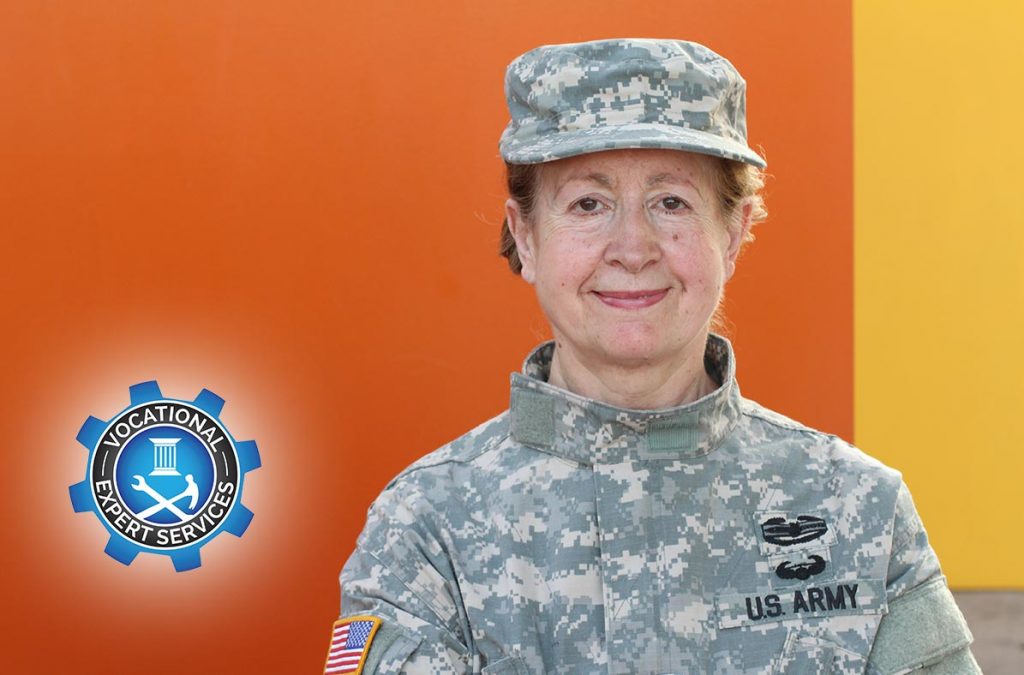by Devin Lessne, MA, MS, CRC, CDMS, ABVE/F, PVE, IPEC and Claire Ziegler, MA, CRC, IPEC
The Orange County Bar Association – The Briefs – October 2020
What are Vocational Assessments for TDIU Claims?
A vocational assessment can provide valuable information for decision-makers regarding Total Disability Individual Unemployability cases, also known as TDIU cases and help answer whether a veteran’s service-connected disabilities prevent him or her from securing substantially gainful employment (“SGE”). The Department of Veterans Affairs (“VA”) defines SGE as “employment that is ordinarily followed by the non-disabled to earn their livelihood with earnings common to the particular occupation in the community where the veteran resides.” The VA specifies that SGE cannot include sheltered or protected employment. Further, if a veteran’s annual wages are below the poverty level, this employment cannot be considered substantially gainful. If a veteran is unable to secure SGE as a result of a service-related disability, then he or she is entitled to receive 100% compensation for TDIU.
Why They’re Essential?
Decision-makers in these types of cases often rely on the opinion of physicians and other medical providers to determine whether a veteran can still obtain SGE. These individuals, however, do not have specialized vocational experience or expertise and are not equipped to determine the feasibility of a veteran’s ability to work. A vocational assessment can help bridge the gap between any documented medical and psychological limitations and residual functional limitations within the context of jobs in the present labor market.
A vocational assessment is a multi-step process and is prepared by a vocational expert (“VE”). The vocational rehabilitation assessment must have a methodology that fulfills the VA requirements to address the critical questions in a TDIU matter. These questions include:
- Is the veteran disabled?
- What is the estimated date of TDIU?
- Was past work sheltered or protected employment?
The analysis also includes a vocational opinion based on both objective and subjective evidence regarding the estimated date the veteran was unable to work at SGE.
Vocational assessments are structured by topic, starting with the reason for the referral. All records to be considered in the matter are summarized in a report. This records summary is critical because it outlines the objective and subjective evidence in the case, including a review of the medical, psychological, and other records contained in the file. Additionally, a thorough interview is conducted with the veteran regarding symptomology, limitations, educational history, and work history.
What Goes into a Vocational Assessment?
This information is synthesized, and the residual functional capacity (“RFC”) of the veteran is identified. RFC is the functional ability a person has after the effects of the disabling condition. RFC can relate to physical and/or mental abilities that result in restrictions on certain behaviors and/or exposure to specific environments. The RFC identified in the records are matched with the veteran’s past work as defined in the Dictionary of Occupational Titles and the functional demands of that job. If the functional limitations preclude past work, the VE will perform a transferable skills analysis. No more than the past fifteen years of work are analyzed as it is no longer realistic to expect skills to continue after fifteen years. For example, if a veteran had worked for the previous fifteen years in unskilled, but physically demanding jobs, no skills would transfer to other work. If the veteran has no past skilled work, or the RFC precludes skills from past work, the VE must consider other, unskilled jobs that both exist in the economy and that would fit within the RFC. In addition, the vocational expert will also provide an analysis regarding the labor market and the actual availability of jobs in the current economy. As part of the conclusion, specific records must be cited to support the RFC and the date the RFC was established. If the RFC precludes any unskilled work in the economy, the VE can conclude that the veteran could not work. This analysis also allows the VE to determine when the veteran became unable to work.
How TDIU Cases are Evaluated?
Decision-makers are often faced with challenges when evaluating TDIU case records without a vocational assessment. Information contained in a veteran’s records can be confusing and contradictory. Identifying the RFCs can be difficult if the records are unclear. The veteran may have unsuccessful work attempts or a history of accommodated work in the past. It is often difficult for TDIU decision-makers to thoroughly unpack and effectively analyze this information. Additionally, decision-makers may struggle to identify the date the veteran became unable to work. A VE has the skills to identify RFCs and past relevant work and to determine how the veteran’s service-connected disabilities may limit their ability to work and earn a substantially gainful income. If the veteran cannot earn a substantially gainful income as a result of his or her service-connected disabilities, the veteran may qualify for a 100% TDIU rating from the VA. Thus, a vocational assessment from a qualified Vocational Expert can be invaluable in supporting a veteran’s TDIU claim.
References
Determining Disability, Unemployability, and Marginal Employment. M21-1MR, Part V, Subpart ii, Chapter 1, Section B (2018).
Havraneck, J. (2007). Advanced issues in forensic rehabilitation (199). Athens, GA: Elliott & Fitzpatrick.
Total Disability Ratings for Compensation Based on Unemployability of the Individual. 38 CFR § 4.16(a) (2011).
Weed, R. O., & Field, T. F. (2001). Transferable skills analysis. Rehabilitation Consultants Handbook (pp. 101-103). Athens, GA: Elliott and Fitzpatrick, Inc.

